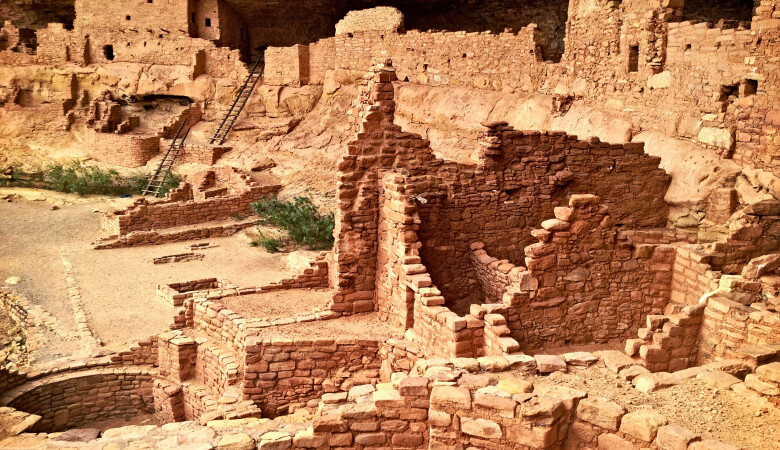Commendation and Creation (Hebrews Sermon 45 of 74)
October 30, 2011 | Andy Davis
Hebrews 11:2-3
Faith, Creation
Two Great Questions
As I come to the text today, there are two great issues that confront me from verses 2-3 of Hebrews 11 that I think confront people all over the world, every culture, every generation. All the time, these questions are among the great questions that face us as human beings. The title of the sermon in the order that we find in Hebrews 11:2 and 11:3 is Commendation and Creation. But kind of reversing them into a more logical order, the question that's in front of us is: "How did we all get here?" A question of origin. And, "What should I live my life for?" A question of significance or meaning.
These things stand over us every single day. Whether an atheist, Christians, Muslim, it doesn't matter, these are the questions that are common to the human condition. We yearn to understand origins, where it all came from, and we yearn to understand what is worthy of my attention in my life, what should I be living for, a sense of purpose or calling or something that is worthy of my attention. And I tell you, we live surrounded by people who are lost on these issues. They're lost. They're without hope and without God in the world, and they live depressing lives, empty lives, and they try to find meaning in created things and they can't really find any ultimate satisfaction in them.
And people who are skillful at capturing those thoughts, authors, playwrights, musicians, artists of various types, have been able to capture the feeling of emptiness that comes from considering the question of origin and the question of worth and coming up with nothing. I mean absolutely nothing. Like, for example, Jean-Paul Sartre in his book "Nausea," parenthetically, why would anyone want to read something called, Nausea? But I guess I read part of it anyway. And this is what he says: "I had always realized it; I hadn't any right to exist at all. I had appeared by chance. I existed like a stone, a plant, a microbe. I could feel nothing to myself but an inconsequential buzzing. I was thinking that here we are eating and drinking to preserve our precious existence and that there's nothing, nothing, absolutely no reason for existing."
Somerset Maugham wrote this: "If one puts aside the existence of God and the survival of life after death as doubtful, one has to make up one's mind as to the use of life. If death ends all, if I have neither to hope for good nor to fear evil, I must ask myself what am I here for, and how in these circumstances I must conduct myself? Now, the answer is plain but so unpalatable that most will not face it: There is no meaning in life, and thus life has no meaning."
Now, I can't live my life like that. And the joyful good news of the Gospel is I don't need to. The universe didn't pop up out of nothing and have no purpose or no meaning. The text today asserts that God created the universe by his word. It's what it says, and it tells me I'll know that only by faith. We'll get into all that. And that based on that faith, if I live in the faith that he alone can give, he will commend me, and that's worth living for. Well, that's it. You've got Hebrews 11:2-3. By faith, we understand a life worthy of commendation, a life worthy of living, and by faith we'll live it and be commended. Secondly, by faith, we understand the origins of the universe, that God created it so that what is seen was not made out of what was visible, and therefore there is a clear priority put on the invisible realm rather than the visible.
Hebrews 11 Set in Context
And that's what we have to look at today in our text. Now, what is the context here? Going back one verse, we had last week, Hebrews 11:1, "Now faith is the assurance of things hoped for, the conviction of things not seen." We talked about that last week, and we saw that faith has a beautiful, sweet, attractive, alluring side in which by faith, we are constantly buoyed up by hope, by assurance, a confidence of incredibly good things yet to come, and they are most certainly going to happen. But also, we are aware of the constant need for conviction of sin, and that the Lord by faith is going to keep us mindful of the truth of ourselves that we're mixed beings now. We are indwelt by the Holy Spirit, but we are also struggling with sin that lives in us. And so, by faith, we are convicted continually of specific ways that that sin acts up, and we repent of it, and with these two aspects of faith, we are conducted safely to heaven.
We need them both, got to have both. And the reason for this whole chapter, this faith chapter, Hebrews 11:1, I'm just going back one step to the end of Chapter 10, there it tells us, "The righteous or the just shall live by faith, and if he shrinks back, I will not be pleased with him. But we are not among those who shrink back and are destroyed but of those who believe and are saved." So, there at the very end of Chapter 10, he's describing the kind of life that leads to heaven, the kind of life that leads to not being destroyed, but rather, to being saved. There's a life that comes. It flows from faith.
That life leads to heaven, not to hell. And so, that's the context. We're looking at faith. We're trying to understand it. We're trying to understand what it brings to us, and in Verse 2 and 3, we have some additional elements.
I. Faith Resulted in the Commendation of the Ancient Saints (vs. 2)
Now, I want to begin in the order that it gives us, so I reverse them logically starting with creation and then going to commendation. We'll just take it in the order that the text gives it. And so, immediately in Verse 2, we have the issue of commendation. Commendation. We are taught in Verse 2, "For by it, by faith, the people of old [or the ancients] received their commendation." So we have in front of us this verse, and we try to understand it. Who were the people of old? Who were these ancients?
And what does commend mean? What does it mean to be commended? Who commended them, on what basis were they commended, and what is the significance of their commendation? These are the things that flow from the text for me. So, in Verse 2, let's start right away. Who are the ancients? What do we mean by this? By faith, the ancients were commended, people of old. The ESV translates it. Well, I think we have a sense from the rest of the chapter who he's meaning, who he's talking about. We go right from Verse 3 into Verse 4, and we find right away, we're talking about Abel. By faith, Abel offered a sacrifice, and then Enoch, we go to Enoch and Noah and Abraham and Sarah and all of these, Moses, all of these great men and women of old, these ancient people, the people who lived in centuries before, or what it says in Hebrews 1, our fathers.
"In the past, God spoke to our forefathers…" the ancients, the ancestors, the people before. Now, Christy and I were missionaries in Japan, and there is... I think there are, in their culture, an unhealthy worship of ancestors. It's part of Shintoism. It's part of the religion there. Christians don't worship ancestors, but we revere or esteem them and we can learn from them. And so, this chapter is filled with the examples of ancients, of people who lived before, and that's who they were. What does it mean that, by faith, they were commended? What is this commendation?
Well, the Greek word relates to a witness or a testimony given to them that they were testified about or positively. So, the word commend is a good translation, a sense in which someone says something positive about them, presents them as positive examples, praises them in some way. That's what the commendation is. And who is it that commended them and how did he do it? Clearly, this is God. There's no doubt about it that it is God who commends these ancient people. And how did he commend them? Well, first and foremost, for our purposes, he commended them in the pages of scripture. And so, Abel's offering was acceptable and his offering was spoken well of in scripture. We'll get to all that, God willing.
And the same thing with Enoch. As he walked with God, he's commended in the pages of scripture concerning his faith and what he did, and Noah's activities in building the ark, his faith and his obedience to God, is commended in the pages of scripture and on and on. All of these examples are spoken well of in the Bible by God. God testifies to them through the authors of scripture by the power of the Holy Spirit. But we have a sense that's just a little bit of a, that's just a tip of the iceberg, don't you? That, I mean, the scripture is a limited book. There's only so much that God could put in. There's a sense that anybody who has lived by faith, God will commend to that person, and that's, I think, why the verse is here, that this isn't just for the ancients and it's just for specifically those people whose stories are recorded in the Bible.
We know, like in 1 Chronicles and the Genealogy, there's a lot of people, we don't have anything of their stories at all. But if any of those lived by faith, the sense from this verse is that God commended them. And so, I have a sense of the heavenly council, you know, the angels and the elders and the four living creatures. And having God say something like he did concerning Job, "Have you considered my servant, Job?" To have God speak well of you, a commendation from God, to have God praise you, I want to talk more about this when we get to verse 6 because I think this is the reward part of it, but that God would praise your activities. He would praise your actions.
I think about what we learned on Wednesday night in the Gospel of John. We're studying there in John 12, and we find in verse 26 an astonishing statement that Jesus makes. You know, in verse 24 he says, "Unless a kernel of wheat falls to the ground and dies, it remains by itself a single seed. But if it dies, it brings forth much fruit." And then, he says, "If you love your life in this world, you lose it, but if you lose it, you'll save it." And then, he says, "Wherever I go, there my servant must be." And then, he says this: "My father will honor the one who serves me." That just still brings goosebumps to me. I mean, to think about the Father, the God and Father of Jesus Christ honoring a human being, speaking highly of them, praising that person, it's commendation, you should want it. You should yearn for that commendation.
I tell you, you should live for it. It should be the organizing principle of your life. I'll say more about that in due time, but I just think this is something worth living for. Don't you? That God would be pleased with you, that he would commend you, that your works would be satisfying to him? And that's the commendation that's listed here. And on what basis were these ancients commended? Well, it's not because of their courage, it's not because of their beauty and not because of their strength, their leadership, their winsome personalities, their financial skill or acuity or business acumen, it's not because of any of those attributes that might, we might even select.
Frankly, it's not even mentioned in reference to their love at this point. But on the basis of their faith, they were commended. Now, we need to understand this, that faith is not meritorious, it doesn't deserve anything, but I really look on faith as the conduit by which sinners like us can be praised by God only by faith. And so it says in Romans 14, "Anything that does not come from faith is sin." Conversely, the implication in this verse two is anything that does come by faith is praiseworthy, commendable. You have to have as many of those good works as you possibly can. Your life should be rich and full in good works, commendable actions, flowing from faith.
What Is the Significance of their Commendation?
And so, what is the significance of Verse 2 for me? Well, first the unity of God's work. What I would mean by that, I mean, in every generation, God's doing the same thing, every single generation, before the flood, after the flood, before Christ, since the time of Christ, in every generation, God always does the same thing. It's always on the basis of faith. And so, therefore, we see a unity also secondly of God's people. We are all the same in this regard even though we live in very different, a very different culture, a different time from those that dwelt in tents and where shepherds, or their wealth was in livestock. We were living in a different culture and yet we are one with them by faith. We are part of an incredible family of faith.
And so, across the generations back to the people of old, there's a unity in God's people. We are one through faith in Jesus Christ. And I'm going to develop this much more next week, God willing. But it's always been faith in Christ, always been faith in Christ, not merely faith in God, but it's faith in Christ that justifies. And so, I'm going to make the case that Abel offered his sacrifice in the name of Christ and that Enoch walked with Christ and that Noah built by faith in Christ, and I'm going to make it all based on one statement in Hebrews 11:26 when it says of Moses that he considered reproach for the sake of Christ as greater worth than the treasures of Egypt.
And so, it's a Christ focus that we have here. It unifies us. In every generation, God has always been doing the same thing. Abraham was justified by faith in Christ and so are we. And so, it's the same thing in every generation. And so, unity of God and his workings with people, the unity of the people of God, comes out of Verse 2 and therefore a unifying principle for your life. Live for the glory of God. Live to display the glory of God so that when he looks at your catalogue of your works, of your words, of your attitudes of your heart, that he may find his own glory there and may commend you. As it says in Romans 2:7, "But for those who by persistence in doing good, seek glory, honor and immortality, he will give eternal life." That's the kind of life that leads to heaven.
II. Faith Understands God’s Creation of the Universe (vs. 3)
So that's what I get out of Verse 2. Now, for the next two hours, we're going to be looking at Verse 3. That's not true. That's one of those preachers so I shouldn't have said that. I would love to. As a matter of fact, Verse 3 has been jumbling around in my brain now for four weeks, and the jumbling actually increased over the last 72 hours, and then it reached kind of a fever pitch this morning. And so, you're all going to be blessed with my jumbled thoughts today. So I came from working on a sermon this morning. Carolyn asked me, she said, "So, how is the sermon?" I said, "Clear as mud." I think it's clearer now than that, I hope. A number of people have been praying for me because Paul urges that we pray for clarity and I want to pray because the themes that flow out of Verse 3 are... Oh, they just don't stop in my brain. I've been thinking about, for example, faith and science for decades.
I've been thinking about evolution, thinking about all these things. It just flows and flows and flows. It just never seem to stop. So for me, the answer is get back to the text, get back to what Verse 3 says. Stick to that first and foremost, and then go as far as time will, reasonable time will allow to talk about the implications of it. All right. So, what are we talking about in Verse 3? Well, you just look at it. By faith, we understand that the universe was formed at God's command so that what is seen was not made out of what is visible. That's what it says. So the topic has to do with the origin of the universe. That's what we're dealing with here. The Greek word "universe," translate universe and some of the translations, is eons. It has a sense of just levels of existence, generations, physical realms.
So we generally think of everything that was created, everything that was made, eons. So we're talking about... I think it's a good translation of the universe. And so, the origin of the universe is in front of us in Verse 3, and specifically, the assertions made positively, "By faith, we understand" the origin of the universe. We understand that the universe was formed at God's command, positively it says that, negatively so that what is seen is not made out of what was visible. So there's a positive assertion made and a negative assertion, and it gives us a sense of what we Christians should think of in terms of origins.
And so what does faith understand, based on this? So I'm going to give you eight things that flow from this. Five of them come right up off the words, three more come more generally from the book of Hebrews or maybe the New Testament in general, but I think you'll see it and what do we understand about creation by faith? Well, first thing that I learned from this is the universe is not ultimate it's not eternal. Neither is it independent. The universe was created it is not true based on this verse that the universe has always existed. It didn't. That's the first thing that faith teaches that the universe had a beginning, and a dependent one at that. I'm going to talk more about that in a minute.
But secondly, that God created the universe. Here, we're going to be different from the intelligent design folks who will never fly that flag because they want to discuss and debate in academia and get along and they want to get into the public schools, they want to do all that, that's fine, I don't have to do that here. Amen. I'm going to fly my flag. And by faith, the God of Abraham, Isaac and Jacob, the God and Father of Jesus Christ made the universe. That's what I believe and that's what faith tells me. By faith, we understand that God and it's in Hebrews, and so this is the God of the Bible, God made it.
Thirdly, that God created it with exactness and precision, everything in its proper place. And that comes from the Greek word translated fashioned or formed. It's a beautiful word hard to get across in English, but the idea is that the universe is beautifully finely made. When I consider the Heavens, the work of your fingers, you get a sense of precision and craftsmanship in the universe. I'm going to talk more about what I mean by that. But by faith, we are able to see the precision and the beauty in the order of the universe that God fashioned it or formed it.
Fourthly, that God created it by certain means and that is the means of His word. That God used his word to create the universe. He spoke and it came into being, "God said, 'Let there be light' and there was light." This is how Genesis I is recorded for us. "God said, 'Let there be an expanse between the waters to separate water from water." "God said, 'Let the waters be gathered to one place and let dry land appear' and it was so.'" God said, "Let the earth bring forth vegetation, seed-bearing plants" and it was so. God just speaks and speaks and speaks and so the word of his power is what just flowing from this, the word of God's power, it's by that means the physical universe exists. I'll talk more about the significance of that for our faith. But I'm just going through these phases now. This is what faith teaches me, it's by the word of God.
And fifthly, we learn from this, that the universe was created or God created the universe out of nothing. So there's a distinction made here between those things that are visible and those things that are invisible and I think ultimately by implication, the distinction between creator and created, there's just a huge gap between the two. And so it is very helpful for us to think of a time when God Father, Son and Holy Spirit, the triune God existed and nothing else existed at all. Nothing. And that is so refreshing and helpful to us, who get so wrapped up in the events of our lives and we forget there was a time that none of this stage on which this drama is unfolding this human history even existed. And I just think it's so helpful for me as a believer, to just kind of center in on God from time to time, and forget everything else. There was a time, there was only God and God created it all out of nothing. That is the central miracle of the Bible, and if you can believe that everything else is child's play, frankly. That God created the heavens and the Earth out of nothing to go from that to Jesus, the Son of God, walking on water, is not a big deal for me. For him raising Lazarus on the dead on the fourth day. That's not a problem for me. I see it his own resurrection. I'm not minimizing these great miracles, I'm just saying for God that created all out of nothing is the central great action on which everything else follows. Alright, let me add three more that don't come directly from the words of verse 3, but are in Hebrews, and I think connected to Verse 3, by implication.
Six, the universe in its present form is temporary. Okay, clearly, this is taught in Hebrews, it's not necessarily coming right from verse 3, but it's there. The universe in its present form is temporary, so in Hebrews 1, 10, and following, quoting a Psalm, it says "They will perish, but You remain. They will all wear out like a robe, like a garment, they will be changed, but you remain the same and your years will never end." Remember that's the Father speaking to the son.
And so, the universe is temporary, later in chapter 12, we're going to talk about those created things that can be shaken and removed. So the created things are temporary what is unseen is eternal and it's temporary, the universe in its present form is temporary. The next one won't be. Amen. The new Heavens and new Earth will not be temporary, but this one in its present form is. Is that helpful for you to know? I think so. I think so. We are going to be told in this chapter. We're aliens and strangers, passing through, and this adds a temporary universe. We are just passing through, like walking through the hall. Alright, we'll get to all that. But it's like walking through the hall, we are walking through the hall. I'll talk at that time about what we ought and ought not to do while walking through the hall, alright? But the point is, we're here temporarily and it's here temporarily. Seventh, the universe exists for God's glory. To put God on display. That's why it's here. By faith, we understand that. The best, maybe one of the best verses on this is Romans 11-36, "For from him and through him and to him are all things, to Him be glory forever and ever, amen." Is that not a healthy way to live your life?
For you to realize, I exist because he spoke me into existence. I'll exist as long as he wants me to exist in this present form and when He takes me back, I'm going back to him to give him an account, and may I live for His glory forever. It's just the best way to think about creation. ‘
And then finally, the universe was created by Christ, for Christ through Christ, it's a Christ-focused universe and we get this right at the very beginning of the book of Hebrews "in the past, God spoke to our forefathers through the prophets at many times and in various ways, but in these last days, He has spoken to us by His son whom He appointed heir of all things, and through whom He made the universe, the Son is the radiance of God's glory and the exact representation of His being, sustaining all things by His powerful word." That's Jesus. The universe, the heavens are telling the glory of Jesus. For me as a Christian, I see that. And so, Colossians 1 tells us that through Christ, all things were made visible and invisible, where the thrones, or powers, or rulers, or authorities, all things that were created by Him and for Him.
Now, if you take those eight things and you bring them to the halls of average academia, you're going to get laughed to scorn and I want to talk about why that is and what to do about it. But for us in the family of God, we take these eight things and we say, "This is true, this is what God's word says. I know it's true by faith, it's true and not only that, it shapes the whole way I live my life." Those eight things. Alright, now I want to dig a little deeper and try to get at a complexity here. This is where I hope it doesn't become clear as mud, but a complexity between faith and understanding between faith and what the mind does, what we call the rational process, the thinking process, ultimately science, we'll get to that. But just by faith, we understand that's what the verse says. How does that work? By faith I understand creation, how do I get at that? And the problem becomes deeper when you look at it. I think a parallel text in Romans Chapter 1, verses 20 through 22, "For since the creation of the world, God's invisible qualities, His eternal power and divine nature have been clearly seen, being understood from what has been made so that men are without excuse," simply put Hebrews 11:3 "By faith, we understand," Romans 1:20, "by creation, we understand that God exists."
How do you put that together? It seems to be mutually exclusive it isn't, but harmonizing that, too, has taken up a lot of my mental time over the last few days. How do you put that together? And let me give you my best shot at it here, okay? This is the thing. Our five senses take in the physical world around us, and tell us things about that world. It starts the moment we enter the world, the moment we're born. And so learning by experience happens before learning by God's word, it just does chronologically. You first learn by experience and then you learn language, and then you learn the Word and then it comes in. That's the order naturally. Okay, so the first thing that happens is your five senses tell you, your sight, your sound, your taste, all of the five senses tells you about the world that's around you. About the sights, the colors, the sounds, the sensations, the taste, the aromas, the... The world is flooding and it's just amazing, isn't it? Marvelous to watch little ones grow and see their eyes just be filled with creation and kind of experience it again, through that. And this is the joy of parenting, one of the many. But just seeing them grow and develop, and then be able to bring scripture in and be able to teach them about God from that.
But here's the deal, I think, for all human beings, creation, the five sense world strews a bunch of information out on a table. Willy-nilly. Just, right there. And it's up to us to make some sense of it, to put it together in what's known as a world view, something that's going to harmonize all that and make sense. And only by faith can you do it well. If you don't have faith, you're going to take all of those raw ingredients and you're going to make a monster like Frankenstein's monster you're going to make a monstrosity a horror out of it. And we heard that at the beginning of the sermon. That's what you'll make of it, it's awful, but by faith, we can understand how to assemble it all and you know what's going to flow out of that healthy assemblage? Praise to God Almighty, you're going to worship Him, you're going to glorify Him, you're going to see the wonders of the universe you're going to see the incredible things that God's built in to the universe, we'll talk about some of those in a minute, but you're going to see it and it's going to make you praise God.
And then after that happens where you're still filled with that, please don't go to infidel.com and find out how they deconstruct all of your excitement about evidence, because it's so depressing. So depressing. See, but now, some of you are going to do it, infidel.com. That's like a... Yeah. What did he do with Lee Strobel's book? Well, we'll get to that in a minute. The fact is that evidence is there Bible tells us it is evidence that God exists. Psalm 19, we've already quoted, "The heavens declare the glory of God; the skies proclaim the work of his hands. 2 Day after day they pour forth speech; night after night they display knowledge." So you go out and you look at the starry host, and it just is telling you of God. God is flowing in, and do you see that? Yes, if you have faith, yes. If not, it's just more raw material and you're going to make a monstrosity out of it. But by faith, we see that Psalm 104 is just the whole Psalm just celebrates the glories of God and physical creation and how he waters the upper hills and how He provides food for all of his creatures the rock badgers, the Coney and all that, and how God has an arrangement for the lions and how they go out at night and the men work during the day and they go out in the sea that ships and then the leviathan plays there, it's just this beautiful Psalm of all that God has made. Oh, how majestic and beautiful it all is.
III. Understanding Creation
And so, I looked at two books in particular, it helped me understand all of this, and the data, the evidence, the evidence for God, it's in the area of the realm of Christian study known as apologetics. So, I've often wondered what is the use of apologetics? Do people actually genuinely come to faith in Christ, when you give them Tim Keller's book, The Reason For God, or Lee Strobel's, The case for the creator, they do, God does that, but we know that faith ultimately comes by hearing God's Word doesn't it? By hearing the Gospel. So what do we do with evidence-based apologetics what would we do with the evidence of God and creation? What kind of evidence is there? Well, there's different categories of evidence. The first is just the existence of the universe itself. The question, "Why is there something rather than nothing?" And there's just a lot of something, isn't there? There's just an awful lot of something. And so why, why is it there? Why is there something rather than nothing? And science has helped to some degree, in this regard, because astronomers have taught us that the universe is expanding and the further away it is the faster it's going.
Hubble saw that through the telescope. Einstein's theories help explain some of that. And so, basically, Stephen Hawking said there's almost no scientists today that doesn't believe in the origin of the universe, there was a time that many would just say the universe is all there ever has been or ever will be, and it's eternal. And so basically the universe... Well, I'll get to that in a minute, but there are views that the universe itself is eternal, but scientists don't even believe that anymore. They talk about the big bang, they just kind of rewind the film and they go back and they say, "Alright, there was this moment when everything in the universe was in this infinite thusly small space and nothing else." I mean, that was it. And then you go, I go, I always go, "Back before that and there's God." Okay? So it helps to ask the question, "Why is there something rather than nothing?" And look at origins. But secondly, Lee Strobel, and Tim Keller both talk about what's known as the finely tuned universe. What do we mean by the fine-tuned universe? Well, it has to do with physics and it has to do with physical constants that define physics.
Constants are just numbers that help physicists do their work and they're just coming from nature to the physicist mind and they just... And everybody agrees that's what it is. For example, there are 15 major ones, like the strong nuclear force and speed of light and universal gravitational constant. And various things like that. This is that clear as mud part. Okay, but let's take for example the universal gravitational constant, it has to do with two massive bodies and their attraction to each other. There's this big G, and the point is it is exactly what it needs to be for life to exist. That's the point. How accurate is it? Let me try to describe it. Alright, I... Never mind. So imagine the universe, this huge big universe, and I'm trying to give you a sense of the number how precise the number has to be. Imagine a... Well, it wouldn't be a yard stick, but a ruler. From one end of the universe to the other, that's how long this ruler is, 15 billion light years across and it's divided up into inches. [chuckle] Inches. Somewhere on there, is the number that is the universal gravitational constant. If you move it one inch to the left or the right, you can't have life. It's exactly where it has to be.
And that's not the only one that's just like that. So also the rate of expansion of the universe is the same thing. I mean, they use these outlandish examples to show how precise this whole thing is, so that nobody even doubts it. Everybody says "Alright, they take these 15 constants. They all have to be within a trillion trillion trillion part accurate and all of them are that accurate, and that's how you have life." Huh, I think there's probably a creator, amen. You know what some people are doing with that? I'll get to that, I won't do it yet, we'll get there. Or how about information in the DNA molecule? I'm not talking about the DNA molecule, I'm talking about the information. What do I mean by that? You remember a few years ago when Coca-Cola changed their recipe and they went to some new flavor, how long did that last? Is that like three weeks? I don't know, I mean it was just like, "Whoa, what is this?" And then it's like, "Okay, we're losing market share, huge, we're hemorrhaging it". So they went to Coke Classic and it's been back that way, ever since. Alright, well, there is some secret top-secret recipe for Coca-Cola alright? It's a recipe. Well, there's a recipe for everything.
There's a recipe for a butterfly's wing, there's a recipe for the eyeball there's a recipe for the fragrance of a rose. There's a recipe, and it's in the DNA molecule, and again if you re-arrange one step of that sequence in that, you don't get the rose's fragrance, you don't get the bird wing, you don't get that stuff.
It's got to be exactly that or you don't get all this complexity, that's information. Where did it come from? And it's ridiculous to say, "Well there are certain physical laws that make it... That make the molecule bind together," and I say, "Look, that has nothing to do with the information, information floats above the medium, doesn't it?" Let's take the newspaper for example, newspaper has ink on it, right? And there are physical laws by which the ink binds to the newspaper, but we don't read the newspaper for that. We try to find out what it's saying, like World War II is over the Germans have surrendered it's there's information that floats above the medium. And I don't really, I'm not really that interested in May of 1945, about how it is that ink adheres to the paper. I'm fascinated by the fact the war is over.
So, there's information. Where did it come from? Came from God, I think. Alright, now these are just some of the evidences. There are many many others. Believers love it, it causes me to worship, it causes me to praise God. Unbelievers shred it if they can or shrug it off. They try to find arguments. Like the first one, they just say, "Alright you believe in God, I just believe in the universe." I mean, you say God's mighty and big and wonderful and amazing and mysterious. I just say all that about the universe. You say that everything had to have a creator, well why didn't God have to have a creator? Whatever argument you give for God, I give it to the universe, that's what they do, it's the games they play. Or on the finally tuned universe, this is really funny. You know what they... Some of them are saying that there are actually infinite numbers of universes, going on and we happen to be in the one that allows life.
I love that one, that's one of my favorites. It's called the multiverse theory. There's zero scientific evidence for it, but imagine, let's, I just don't think we can live this way. I don't think we can live life like that way. I mean think about the old scene back in Wild West when there's a bunch of grungy gun fighter guys playing poker, and the dealer deals himself 20 consecutive four ACE hands 20 consecutive times, he got four aces all right. I don't think they make it to 20, but let's just, for the sake of my ridiculous illustration. All right, the 20th one, the other three are really upset with this guy, and they start to pull out their six shooters. All right. He said, "Now, wait a minute. Could it be that we're living in, just the one universe where actually I did honestly deal to myself 20 consecutive winning hands?" I think he's dead within four seconds. What do you think maybe two? We don't live life like that. It's not realistic and it sure isn't science. Science deals with what you can measure. What you can observe about theories about postulates and things you can test, you can't test multiverse.
Bottom line is there's an amazing, incredible creator and He's revealed to us in Jesus Christ, in the scripture. But here's the fundamental thing, this is what unbelievers will do, and it's what they'll keep on doing, and it's what they're going to continue doing. I mean we talked about it on Wednesday night with Lazarus, what happened with Lazarus? God... Jesus raised him from the dead, he is walking, evidence of the deity of Christ. Oh, the unbelievers all want to get to know him so they can become believers in Jesus right? No, they want to kill him, too. They want to kill the evidence and so that's what they try to do, they try to kill the evidence. Well, in my opinion, the number one evidence-killer there is, is atheistic evolution. It's the naturalistic explanation for everything.
We don't need a God of the gaps, a God to step into the place we don't understand. Give science enough time and we'll have a natural explanation for everything. And so, what Darwin gave to the unbelievers, of the world, a intellectually creditable kind of explanation of how random mutations and natural selection can explain everything we see around us which I find just amazing. I don't know how it can... I've often wondered and no one has a good answer to this. Where did the first living cell come from? You have a bunch of chemicals, bunch of chemicals, nothing's alive, nothing's alive. Then, first cell. And it has a cell wall, and it has DNA to pass on its recipe to its child, and it can eat and it can excrete and it can breathe and it can do all the stuff you have to do to have life, and it doesn't live long because the cells don't usually, but it just-in-time replicates and then dies. Okay, that's all very interesting.
And so, you go from the Big Bang to, galaxy clouds and they coalesce and you get a solar system exactly arranged like it needs to be for life with the earth, just the right distance from the sun and you've got water being a really weird substance that floats when it becomes a solid just amazing weird stuff about water. And out of all of this comes and then you suddenly have your first cell. Well we're a long way from a human being friends, an awfully long way, step by step by step. I wrote out the journey here, I can't remember it. I'll just read it for you. You go from non-living chemicals to amino acids from amino acids to proteins, from proteins to RNA, RNA to DNA, DNA to the single celled organism, that's the first living thing, single celled organisms to multi-celled organisms in which they are sharing functions, multi-celled organisms to invertebrate marine life, invertebrate marine life to vertebrate marine life, vertebrates to amphibious animals, amphibious animals to reptiles, reptiles to mammals, mammals to primates, primates to the human race.
Every single step, the jump is just incalculable in complexity, what I call the inverted house of cards in a wind storm. And the wind storm is whether it's law of entropy, second law thermodynamics, all the stuff, breaking stuff down all the time but it's getting more and more complex all the time. If you can believe that. Oh, how do I finish the sentence? But it's the only other alternative there is, evolution and creation are the two answers for how we got here. There isn't a third and so you gotta have this or you're going to have the other and they dread the other. And I want to ask... All right, if this has been going on for millions and billions of years where are all the fossils? I mean, this is a continual development, right? A continual development, instead the fossil shows snapshots of creatures, some of which still exist and some of which don't that appear in the fossil record fully formed.
I want to know where is 99% of a coelacanth or 90% of one? Where is the development? There aren't any, they just pop up there they are, it's creepy-looking old. You've seen him at the Museum of Natural Sciences. They look like hermit crabs, Right? But they've got articulated arms, they've got eyes, they've got all this... Where did all that come from? I can't make a coelacanth and neither can you. They're out of nowhere. Why doesn't the fossil record show this constant development? You know what I think? I think that evolution is a religion, I think it takes faith and as some humorous once put it, evolution is the assurance that fossils hope for and the conviction of transitional forms not seen.
And they keep waiting for it to come at some point, it's going to come. Darwin said the fossil record didn't show it, Charles Lyell, who came up with the column, the geological column, he said, "I don't believe in natural selection because the fossil record doesn't show it." Well in the next 150 years, we'll find them. Haven't found them and friends, we should be tripping over them, we shouldn't be able to be able to drive home because there's so many of them around. It's been billions of years after all. And thirdly, what Michael Behe has given us, irreducible complexity. I'll put it this way, in common language, what good is 28% of a wing? And it needs to be good or natural selection doesn't work, it's got to be an advantage to the species or it will get selected out and not only that, 29% has to be a little bit more of an advantage than 28% and 30% a little bit more. And then eventually you get a wing that actually works after 10 million years, doesn't make any sense, friends.
And yet in the halls of academia, whether at Duke, UNC at MIT, at different places we are brow beaten and we are intimidated and afraid to speak up because of the emperor's new clothes, you won't get societal recognition, you won't get research dollars because you won't sing from their piece of sheet music and you know what this guy in infidel.com did with all of the experts, with Lee Strobel, interviewed their PhDs, whatever, he would either say yes but they're not PhDs in the field they're discussing, or he would say in Michael Behe's case, yes, but it's not the majority view of the field. Dismiss, dismiss, dismiss.
All right, why is all this happening? Because God wills it. And let me tell you, this is very important, you need to understand what I'm saying here. God has not willed that it be logically inescapable that He exists, He has given the unbeliever a window to crawl out of if he wants to. He just wills to do it in that way. But what he has told us is in Romans I, it is morally inexcusable for them not to believe in God, they will have no excuse on judgment day, none. Not logically inescapable. But, morally inexcusable. And God wills it, that way specifically when it comes to the gospel of Jesus Christ. 1 Corinthians 1, "For since in the wisdom of God, the world through its wisdom did not know God." Now, take the word wisdom out and put the word science in there. Okay. For since in the wisdom of God, the world through science did not know Him and can't know Him. And so what that verse is saying, is it was wise for God to make it impossible for science to find him, it was wise why? Because he didn't want us boasting in heaven about our intellectual process by which we reasoned out his existence instead he made us dependent on faith that he alone can give and if He doesn't give it to you, you will not believe these things. It's a gift of God.
"For since in the wisdom of God, the world through its wisdom did not know Him, God was pleased through the foolishness of what was preached, to save those who believe. Jews demand miraculous signs and Greeks look for wisdom, but we preach Christ crucified, a stumbling block to Jews and foolishness to Gentiles, but to those whom God has called, both Jews and Greeks, Christ, the power of God and the wisdom of God, for the foolishness of God is wiser. The man's wisdom and the weakness of God is stronger than man's strength." And so I am the sermon by preaching the cross of Jesus Christ. All Faith is not ultimately directed toward the universe and all that, it's directed toward the cross of Jesus and God sent his son into the world and He died on the cross. What looks foolish to man, but what is beautiful to the believer, Jew and Gentile alike. Jesus is God's righteousness, His wisdom, His power, and if you confess His name, if you believe that God sent Him that He died on the cross for your sins and that God raised Him up on the third day you will be saved. Live for that. Live for commending the God who did all of these things. It's worth a life worth living. Close with me in prayer.






























